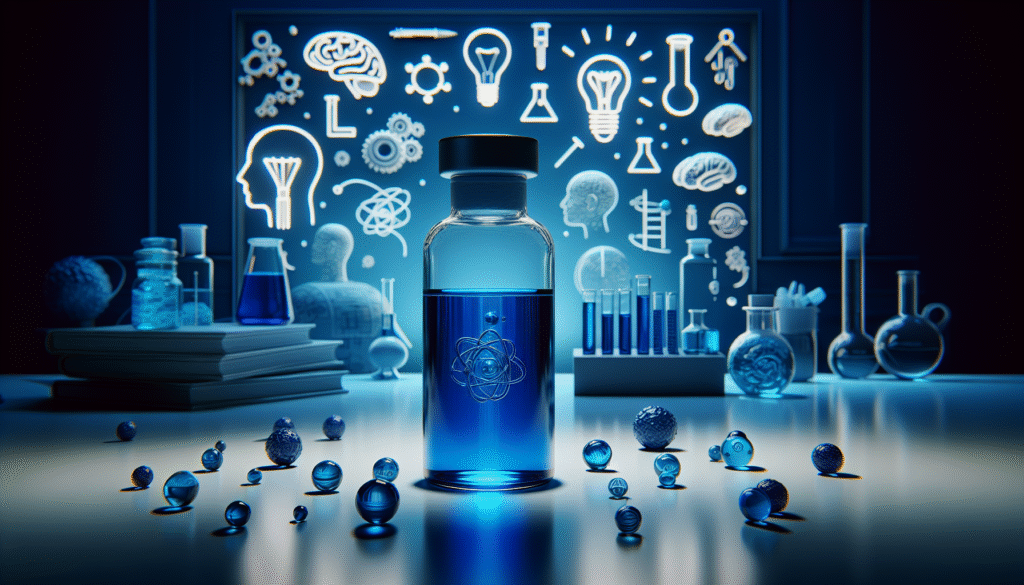
Have you ever questioned how a single compound could potentially revolutionize your cognitive abilities? Methylene Blue is gaining attention in scientific circles, and understanding its properties and potential effects on cognition might just shift your perspective on mental enhancement.

Understanding Methylene Blue
Methylene Blue, a synthetic dye originally developed in the late 19th century, has been utilized in various fields including medicine, biology, and microbiology. Initially, it served as a treatment for malaria, but it has since been recognized for its potential therapeutic advantages across different conditions and its fascinating role in neuroscience.
Historical Context
In the medical world, Methylene Blue is recognized as one of the oldest synthetic medications. Its journey began as a treatment for malaria, but over the decades, its applications have evolved dramatically. The dye’s properties have led to its use in various medical treatments, including antifungal and antimalarial therapies, and even as a diagnostic tool in certain medical imaging processes. Its broad spectrum of applications speaks volumes about its intricate relationship with biological systems.
Chemical Composition
Chemically, Methylene Blue is a thiazine dye, which means it shares properties with a class of compounds known for their ability to interact with biological tissues. Its molecular formula is C16H18ClN3S, and its distinctive blue color arises from its structure. This compound not only serves as a dye but also exhibits some essential biochemical activities that could be relevant to cognitive functions.
Mechanism of Action
To comprehend how Methylene Blue can enhance cognitive function, it is critical to understand its mechanism of action within the brain and body. The compound exerts its effects on various cellular processes, particularly those related to energy metabolism and electron transport.
Energy Metabolism
One of the key roles of Methylene Blue is its ability to improve mitochondrial function. Mitochondria are the powerhouse of cells, generating adenosine triphosphate (ATP), the energy currency of the cell. By acting as an electron donor in the mitochondrial respiratory chain, Methylene Blue can enhance ATP production, potentially leading to improved energy availability in brain cells.
Neuroprotection
Another important aspect of Methylene Blue’s effect is its neuroprotective properties. Research indicates that Methylene Blue may help mitigate oxidative stress and inflammation, which are factors that can damage neurons over time. By scavenging free radicals and enhancing antioxidant defenses, Methylene Blue may help preserve cognitive function.
Neurotransmitter Modulation
Methylene Blue also exhibits the ability to influence neurotransmitter systems. For instance, it has been shown to enhance the release of serotonin, a neurotransmitter associated with mood regulation and cognitive function. Additionally, it may enhance the action of other neurotransmitters, such as norepinephrine and dopamine, each playing critical roles in attention, memory, and overall cognitive clarity.
Cognitive Benefits of Methylene Blue
With a foundational understanding of Methylene Blue’s properties and mechanisms, it is essential to examine its specific cognitive benefits supported by research.
Enhanced Memory and Learning
Studies have shown that Methylene Blue can improve memory retention and enhance learning capabilities. This effect is attributed to its role in promoting synaptic plasticity, which is essential for acquiring new information and forming long-term memories.
In one study involving aged rats, Methylene Blue led to significant improvements in performance on memory tests compared to their untreated counterparts. Such findings provide preliminary evidence that this compound might assist in reversing age-related cognitive decline.
Increased Focus and Attention
Methylene Blue’s effects on neurotransmitter systems may translate into increased focus and attention. By improving energy metabolism and modulating key neurotransmitters, it has the potential to enhance mental clarity and reduce distractions, which are critical for optimal cognitive performance.
Mood Enhancement
Beyond cognitive enhancement, Methylene Blue may also promote emotional well-being. Its influence on serotonin levels can help improve mood, reduce anxiety, and combat symptoms related to depression. Cognitive performance and emotional health are closely interconnected, and by bolstering mood, Methylene Blue may indirectly enhance cognitive function as well.
Combatting Neurodegeneration
In conditions like Alzheimer’s and Parkinson’s disease, neurodegenerative processes can lead to significant cognitive decline. Research suggests that Methylene Blue may play a protective role against neuronal degeneration. Its ability to enhance mitochondrial function and reduce oxidative stress could theoretically slow the progression of these diseases, providing renewed hope for cognitive preservation.
Dosage and Usage
Understanding the appropriate dosage and administration of Methylene Blue is crucial for achieving the desired cognitive benefits while minimizing potential risks.
Typical Dosage
In clinical studies where Methylene Blue has been utilized for cognitive enhancement, dosages typically range from 0.5 mg to 4 mg per kilogram of body weight. However, the ideal dosage can vary based on individual needs and specific health conditions.
Methods of Administration
Methylene Blue is available in various forms, such as pills, liquids, and intravenous solutions. The most common route for non-clinical use is oral supplementation. It is essential to consult with a healthcare professional before beginning any regimen involving Methylene Blue to determine the most appropriate method and dosage for your unique circumstances.
Safety and Side Effects
While Methylene Blue has demonstrated potential cognitive benefits, it is also vital to consider safety and potential side effects. Generally, Methylene Blue is well-tolerated at low doses, but some individuals may experience side effects such as:
| Side Effect | Description |
|---|---|
| Nausea | Some users may experience gastrointestinal discomfort. |
| Headaches | Occasional headaches have been reported following use. |
| Urine Discoloration | A harmless side effect where urine may appear blue-green. |
| Allergic Reactions | Individuals with specific sensitivities may experience rashes or itching. |
To ensure safety, starting with a lower dose and gradually increasing it while monitoring how your body responds is advisable. If any adverse reactions occur, discontinue usage and consult a healthcare professional.

Research and Future Directions
The scientific community is increasingly recognizing Methylene Blue’s potential benefits in cognitive enhancement. Ongoing research is essential to further elucidate its mechanisms, establish optimal dosing protocols, and confirm its efficacy across different populations.
Current Studies
Current studies explore various facets of Methylene Blue, including its use in age-related cognitive decline, mood disorders, and its potential as a neuroprotective agent in neurodegenerative diseases. Trials assessing cognitive performance in different age groups are ongoing, with promising preliminary findings suggesting Methylene Blue could have a role in enhancing memory and focus.
Future Potential
As the understanding of Methylene Blue continues to evolve, future research may uncover additional cognitive benefits and therapeutic applications. Given its multifaceted properties, this compound could potentially be integrated into broader cognitive enhancement protocols, especially for those facing cognitive decline due to aging or neurodegenerative disorders.
Conclusion
Methylene Blue presents an intriguing potential in the realm of cognitive enhancement. With its historical significance, multifarious mechanisms of action, and emerging research highlights, this compound could serve as a valuable tool for improving cognitive function, enhancing memory, and bolstering overall mental health.
As scientific inquiry into Methylene Blue expands, its therapeutic applications may push the boundaries of traditional cognitive enhancement, offering new avenues for both personal and clinical domains.
If you are considering the inclusion of Methylene Blue in your cognitive enhancement regimen, consulting with healthcare professionals for tailored advice is essential. Understanding your unique cognitive goals, health status, and the latest research findings will pave the way for informed decisions that can maximize your cognitive potential thoughtfully and safely.